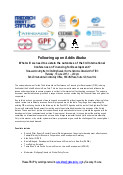Upcoming Event: Following up on Addis Ababa
Published on Thu, 2015-06-18 00:00
The outcome document for the Third International Conference on Financing for Development (FfD3) is being finalized at the United Nations in New York. This is a key moment to make an assessment and influence the issues under negotiation to ensure progress is not lost in the interests of fact-tracking consensus. The outcome document must establish new ground on a range of issues such as combatting illicit financial flows and global tax cooperation. At a side-event jointly organized by Friedrich-Ebert-Stiftung, APWLD, Regions Refocus, DAWN, SID, Latindadd, CIDSE, FTC, Eurodad, GPF, Social Watch, Third World Network and ANND, we want to discuss proposals and compromises on the table and look into possible outcomes of the Addis Ababa conference. What will we need to sustain the outcomes of the 3rd International Conference on Financing for Development? Side-event during the 3rd Drafting Session for the Outcome Document for FfD3 The outcome document for the Third International Conference on Financing for Development (FfD3) is being finalized at the United Nations in New York. This is a key moment to make an assessment and influence the issues under negotiation to ensure progress is not lost in the interests of fact-tracking consensus. The outcome document must establish new ground on a range of issues such as combatting illicit financial flows and global tax cooperation. Key to this is action on proposals of monitoring and accountability without repeating the mistake of leaving follow-up and review to insufficient processes. Several proposals are on the table. They range from integrating the existing FfD monitoring track into the follow-up for the Post-2015 Agenda and the work of the High-level Political Forum on Sustainable Development to creating a set of specialized bodies under the auspices of the United Nations. These would not just monitor outcomes and implementation but also carry forward the agenda with the development of new instruments and policies. One proposal, for example, is to supplement the existing expert committee on international cooperation on tax with an intergovernmental tax body with universal membership. Only in this manner, or by similar systemic reforms, proponents argue, could the challenges of the current global economic system be addressed. Panelists include
Moderator: Mr. Wolfgang Obenland, Global Policy Forum Due to the ongoing intergovernmental negotiations, this program may be subject to short-term changes. Please RSVP by sending an email to sabaloftus@globalpolicy.org by Tuesday, 16 June. |
SUSCRIBE TO OUR NEWSLETTER



